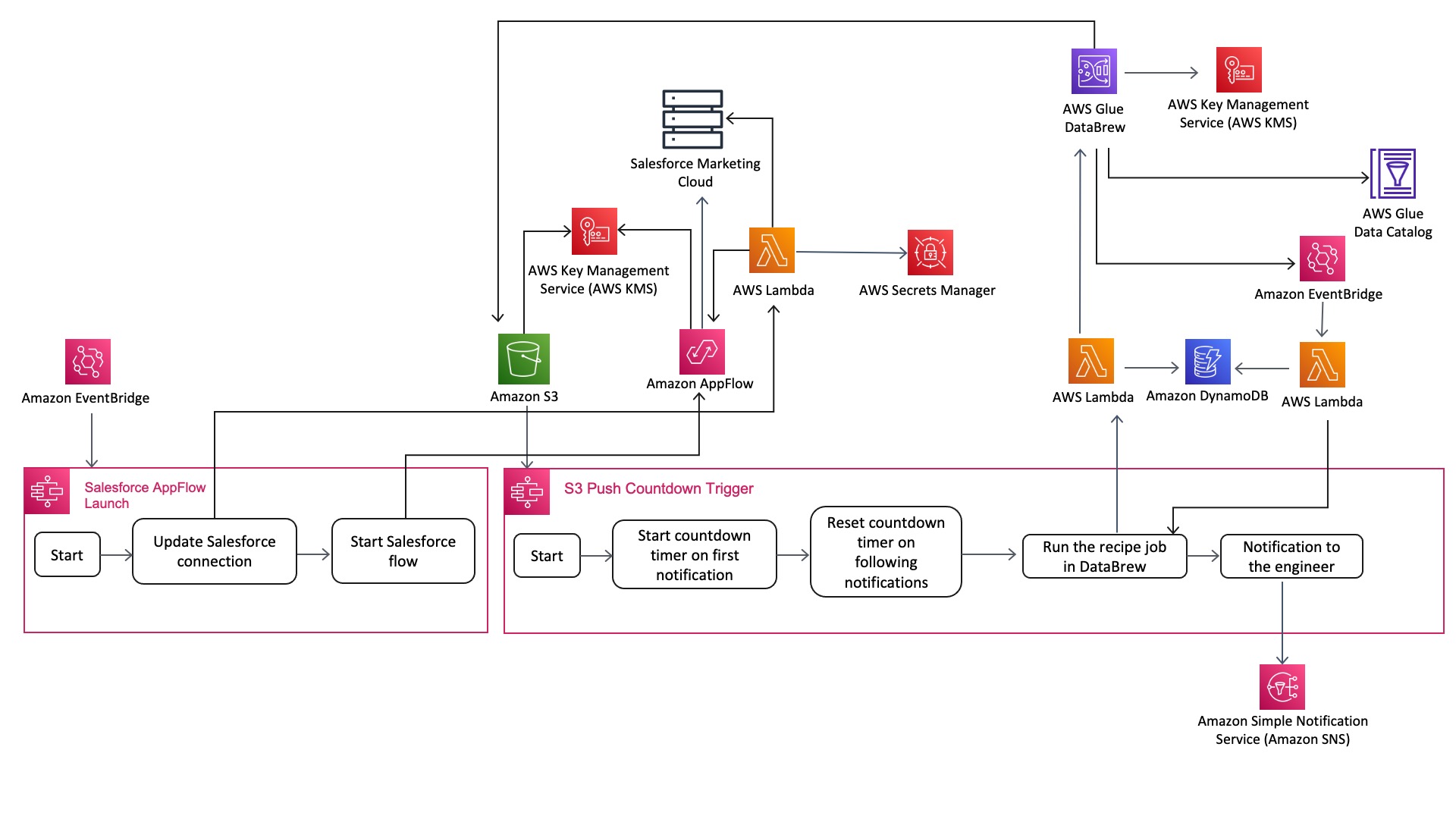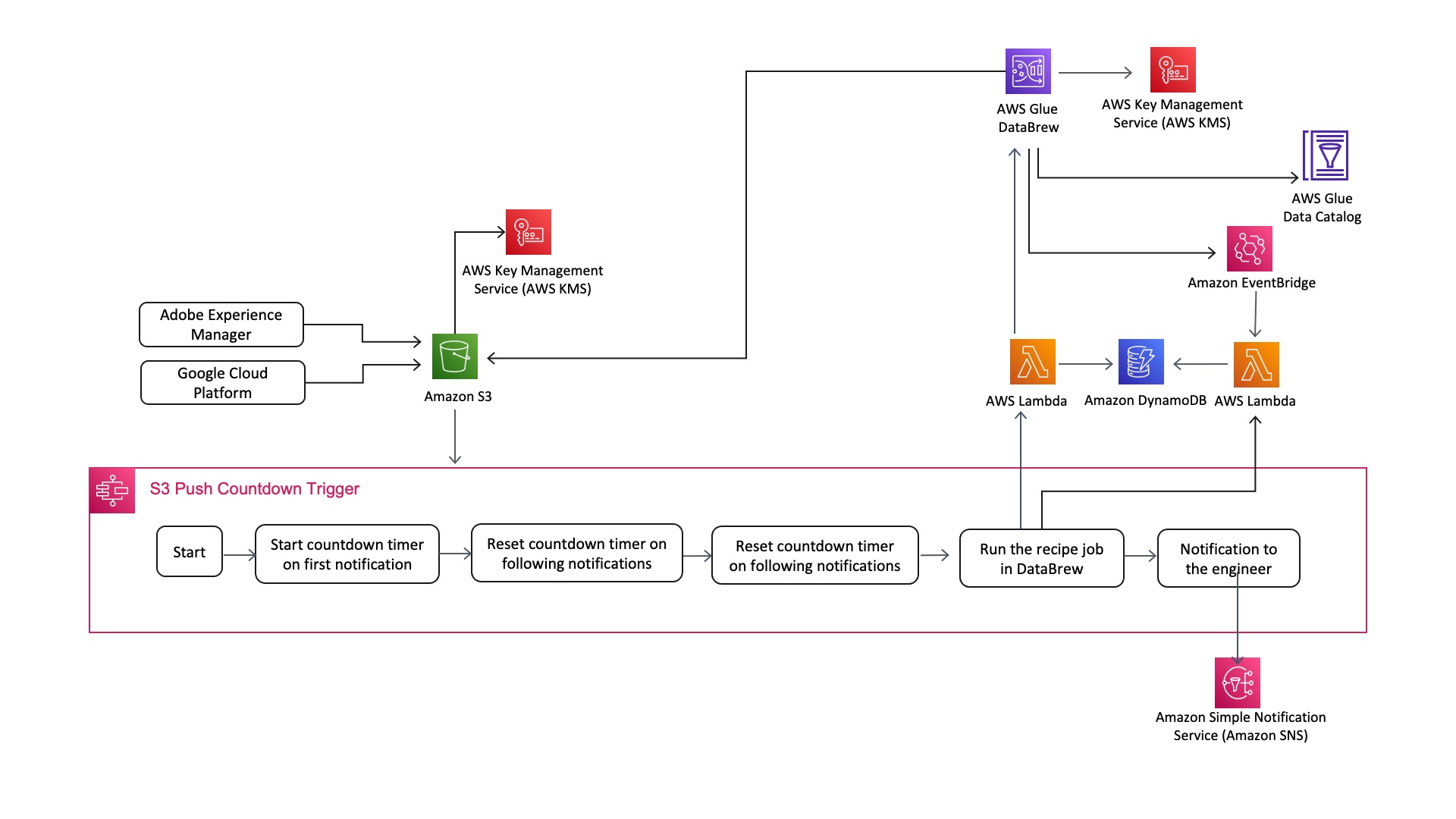Warning
THIS AWS SOLUTION IS NO LONGER MAINTAINED
The following image shows the architecture of the solution for pulling data from a provider using Amazon AppFlow.
The following image shows the architecture of the solution for pushing S3 data from a provider into an S3 bucket.
Note: From v1.0.0, AWS CloudFormation template resources are created by the AWS CDK and AWS Solutions Constructs.
AWS CDK Solutions Constructs make it easier to consistently create well-architected applications. All AWS Solutions Constructs are reviewed by AWS and use best practices established by the AWS Well-Architected Framework.
You can launch this solution with one click from the AWS Solutions landing page.
To customize the solution, or to contribute to the solution, see Creating a custom build
To customize the solution, follow the steps below:
The following procedures assumes that all the OS-level configuration has been completed. They are:
- AWS Command Line Interface
- Python 3.9 or newer
- Node.js 16.x or newer
- AWS CDK 2.7.0 or newer
- Amazon Corretto OpenJDK 11
Please ensure you test the templates before updating any production deployments.
git clone https://github.com/aws-solutions/data-connectors-for-aws-clean-rooms
python -m venv .venv
source ./.venv/bin/activate
cd ./source
pip install -r requirements-dev.txt 2. After introducing changes, run the unit tests to make sure the customizations don't break existing functionality
pytest --cov Packaging and deploying the solution with the AWS CDK allows for the most flexibility in development
cd ./source/infrastructure
# set environment variables required by the solution
export BUCKET_NAME="my-bucket-name"
# bootstrap CDK (required once - deploys a CDK bootstrap CloudFormation stack for assets)
cdk bootstrap --cloudformation-execution-policies arn:aws:iam::aws:policy/AdministratorAccess
# build the solution
cdk synth
# build and deploy the solution
cdk deployIt is highly recommended to use the AWS CDK to deploy this solution (using the instructions above). While CDK is used to
develop the solution, to package the solution for release as a CloudFormation template, use the build-s3-cdk-dist
build tool:
cd ./deployment
export DIST_BUCKET_PREFIX=my-bucket-name
export SOLUTION_NAME=my-solution-name
export VERSION=my-version
export REGION_NAME=my-region
build-s3-cdk-dist deploy \
--source-bucket-name DIST_BUCKET_PREFIX \
--solution-name SOLUTION_NAME \
--version_code VERSION \
--cdk-app-path ../source/infrastructure/deploy.py \
--cdk-app-entrypoint deploy:build_app \
--region REGION_NAME \
--syncParameter Details
$DIST_BUCKET_PREFIX- The S3 bucket name prefix. A randomized value is recommended. You will need to create an S3 bucket where the name is<DIST_BUCKET_PREFIX>-<REGION_NAME>. The solution's CloudFormation template will expect the source code to be located in the bucket matching that name.$SOLUTION_NAME- The name of This solution (example: solution-customization)$VERSION- The version number to use (example: v0.0.1)$REGION_NAME- The region name to use (example: us-east-1)
This will result in all global assets being pushed to the DIST_BUCKET_PREFIX, and all regional assets being pushed to
DIST_BUCKET_PREFIX-<REGION_NAME>. If your REGION_NAME is us-east-1, and the DIST_BUCKET_PREFIX is
my-bucket-name, ensure that both my-bucket-name and my-bucket-name-us-east-1 exist and are owned by you.
After running the command, you can deploy the template:
- Get the link of the
SOLUTION_NAME.templateuploaded to your Amazon S3 bucket - Deploy the solution to your account by launching a new AWS CloudFormation stack using the link of the template above.
Note:
build-s3-cdk-distwill use your current configuredAWS_REGIONandAWS_PROFILE. To set your defaults, install the AWS Command Line Interface and runaws configure.
Note: You can drop
--syncfrom the command to only perform the build and synthesis of the template without uploading to a remote location. This is helpful when testing new changes to the code.
This solution collects anonymous operational metrics to help AWS improve the quality of features of the solution. For more information, including how to disable this capability, please see the implementation guide.
Copyright Amazon.com, Inc. or its affiliates. All Rights Reserved.
Licensed under the Apache License, Version 2.0 (the "License"); you may not use this file except in compliance with the License. You may obtain a copy of the License at
http://www.apache.org/licenses/LICENSE-2.0
Unless required by applicable law or agreed to in writing, software distributed under the License is distributed on an "AS IS" BASIS, WITHOUT WARRANTIES OR CONDITIONS OF ANY KIND, either express or implied. See the License for the specific language governing permissions and limitations under the License.

